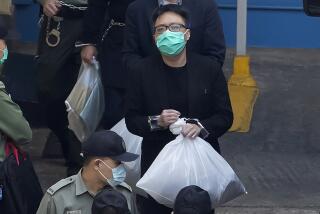China Sentences Wu to 15 Years, May Expel Him
WASHINGTON — China announced today that American human rights activist Harry Wu has been tried and sentenced to 15 years in prison and will be expelled from the country for stealing state secrets and for other charges.
In Washington, Clinton Administration officials said the formal sentence left uncertain whether Wu, a resident of Milpitas, Calif., will be expelled immediately or whether he will be required to serve some of his prison term first.
“The Chinese have not clarified that point,” an Administration official said Wednesday night. “We continue to believe that Mr. Wu should be allowed to leave China immediately.”
Even if Wu is expelled from China immediately, the 15-year prison term will stand. It ensures that, if Wu ever tries to return to China and is caught doing so, he will have to serve the sentence.
The punishment was announced in a brief statement by the government-controlled New China News Agency, which said the conviction and sentence had been handed down by the Wuhan Intermediate People’s Court. A consular officer from the U.S. Embassy in Beijing had been present in the courtroom to observe the trial and sentencing, Administration officials said.
Wednesday night, U.S. officials said they had been notified that Wu was sentenced to 13 years in prison for stealing state secrets and to three years for impersonating a police officer. The two counts were consolidated to a single sentence of 15 years.
Wu has the right to appeal within 10 days, the news agency said. However, Wu and his attorney have decided not to do so, said U.S. Embassy spokesman Robert Laing. Appeals in China virtually never change the verdict.
The timing of the sentence appears to be an effort on China’s part to clear up Wu’s case before it further impairs U.S.-China relations.
Those ties have also been strained by trade and human rights disputes as well as the Taiwanese president’s visit to the United States in June and ensuing Chinese missile tests near Taiwan. Beijing regards Taiwan as a rebel province and has threatened to use force if the island off its southeast coast declares independence.
This weekend, a senior Administration official will arrive in Beijing for talks aimed at improving U.S.-Chinese ties, and the International Women’s Conference is scheduled to open in Beijing next month.
State Department spokesman David Johnson acknowledged Wednesday that the Clinton Administration and Chinese authorities had been talking with each other about Wu’s case.
Administration officials have made clear that First Lady Hillary Rodham Clinton would like to attend the women’s conference but that it would be hard for her to do so if Wu is still in jail. Republican leaders in Congress, human rights groups and Wu’s wife have all urged Mrs. Clinton not to travel to Beijing unless Wu is set free.
White House Press Secretary Mike McCurry told The Times on Tuesday that Mrs. Clinton’s proposed trip to China and Wu’s release “are now linked one way or another, even though there are strong arguments not to make that linkage.”
Wu, 58, who had been imprisoned in Chinese labor camps from 1960 to 1979, has crusaded in this country for reforms in China’s prison system. For example, using film made from hidden cameras during previous trips to China, he helped “60 Minutes” produce a 1991 program on China’s export of goods made with prison labor.
He also helped the British Broadcasting Corp. make a program last year on China’s purported use of organs from executed prisoners in transplant operations for well-connected Chinese. Last month, Chinese authorities sold to some Western news outlets a videotape in which Wu, under interrogation, supposedly confessed that the BBC documentary was not entirely accurate.
Wu--whose Chinese name is Wu Hongda--was detained in June after he tried to enter China at a remote border outpost in Kazakhstan.
More to Read
Sign up for Essential California
The most important California stories and recommendations in your inbox every morning.
You may occasionally receive promotional content from the Los Angeles Times.










